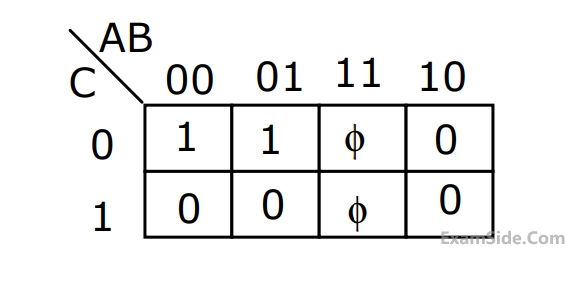1
GATE EE 2014 Set 3
MCQ (Single Correct Answer)
+2
-0.6
A $$3$$-bit gray counter is used to control the output of the multiplexer as shown in the figure. The initial state of the counter is $${000_2}.$$ The output is pulled high. The output of the circuit follows the sequence


2
GATE EE 2008
MCQ (Single Correct Answer)
+2
-0.6
A $$3$$ line to $$8$$ line decoder, with active low outputs, is used to implement a $$3$$- variable Boolean function as shown in the figure: The simplified form of Boolean function $$F(X,Y,Z)$$ implemented in 'Product of Sum' form will be


3
GATE EE 2006
MCQ (Single Correct Answer)
+2
-0.6
A $$4 \times 1\,\,MUX$$ is used to implement a $$3$$- input Boolean function as shown in figure. The Boolean function $$F\left( {A,\,\,B,\,\,C} \right)$$ implemented is


4
GATE EE 2000
MCQ (Single Correct Answer)
+2
-0.6
The minimal product-of-sums function described by the $$K$$-map given in Fig.


Questions Asked from Combinational Circuits (Marks 2)
Number in Brackets after Paper Indicates No. of Questions
GATE EE Subjects
Electromagnetic Fields
Signals and Systems
Engineering Mathematics
General Aptitude
Power Electronics
Power System Analysis
Analog Electronics
Control Systems
Digital Electronics
Electrical Machines
Electric Circuits